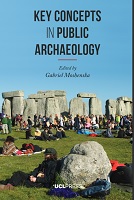Key Concepts in Public Archaeology
Contributor(s)
Moshenska, Gabriel (editor)
Language
EnglishAbstract
This book provides a broad overview of the key concepts in public archaeology, a research field that examines the relationship between archaeology and the public, in both theoretical and practical terms. While based on the long-standing programme of undergraduate and graduate teaching in public archaeology at UCL’s Institute of Archaeology, the book also takes into account the growth of scholarship from around the world and seeks to clarify what exactly ‘public archaeology’ is by promoting an inclusive, socially and politically engaged vision of the discipline. Written for students and practitioners, the individual chapters provide textbook-level introductions to the themes, theories and controversies that connect archaeology to wider society, from the trade in illicit antiquities to the use of digital media in public engagement, and point readers to the most relevant case studies and learning resources to aid their further study.
Keywords
archaeology; heritage; historical sites; public archaeology; Community archaeology; Cultural heritage; TextbookDOI
10.2307/j.ctt1vxm8r7OCN
1004999310Publisher
UCL PressPublisher website
https://www.uclpress.co.uk/Publication date and place
2017Classification
Architecture: professional practice
Museology and heritage studies
Archaeology
Travel guides: museums, historic sites, galleries etc


 Download
Download Web Shop
Web Shop